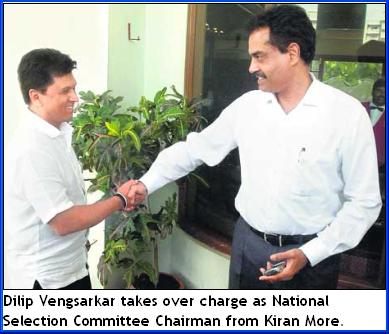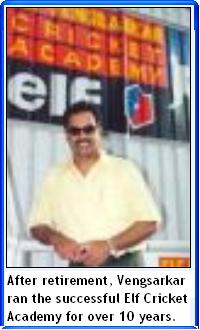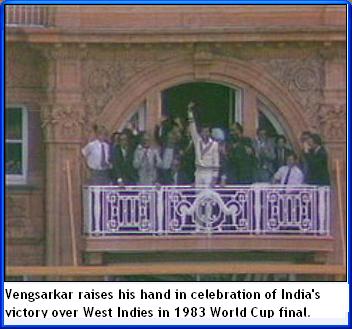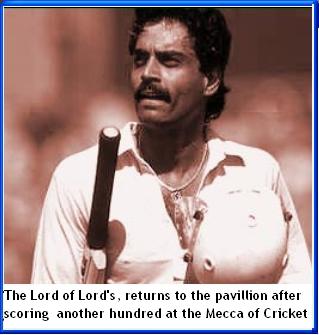It’s very heartening to see that at last the “Colonel” gets his due respect. Dilip Balwant Vengsarkar, one of the most stylish and elegant batsmen to have played test cricket from the subcontinent has been appointed as the new chairman of the Indian Cricket’s National Selection Committee. His immediate challenge starts with the NKP Salve Challenger Cup. Though the squads for both Challenger Cup and subsequent Champions Trophy are already decided, Vengsarkar will have enough work cut out for him while choosing the teams for the Indian tour of South Africa and getting the right mix for the ICC World Cup 2007.
 One of my all-time favorite cricketers, Dilip Vengsarkar, without any doubt is the most eligible candidate for the post. Especially working with youngsters for so long via his Elf Cricket Academy and as Chairman of BCCI’s Talent Resource Development Wing (TRDW), he brings in tremendous experience to the Selection Committee’s table. With his natural eye for talent , which spotted and groomed young guns like Parthiv Patel, Irfan Pathan, Avishkar Salvi, Yuvraj Singh, Ramesh Powar,Suresh Raina, Rudra Pratap Singh and V.R.V. Singh, we can expect a more stable and strong Indian side for years to come.
One of my all-time favorite cricketers, Dilip Vengsarkar, without any doubt is the most eligible candidate for the post. Especially working with youngsters for so long via his Elf Cricket Academy and as Chairman of BCCI’s Talent Resource Development Wing (TRDW), he brings in tremendous experience to the Selection Committee’s table. With his natural eye for talent , which spotted and groomed young guns like Parthiv Patel, Irfan Pathan, Avishkar Salvi, Yuvraj Singh, Ramesh Powar,Suresh Raina, Rudra Pratap Singh and V.R.V. Singh, we can expect a more stable and strong Indian side for years to come. Also referred to as the Lord of Lord’s for his unparalleled feat of three hundreds by a non-England cricketer, an achievement even the great Don was unable to register, at the Mecca of cricket, Vengsarkar’s name is permanently etched in the record books. As long as the Lord’s cricket ground enjoys its unique place as the cricket headquarters Vengsarkar will keep his place intact , especially early next year MCC will be sending an artist to Bombay for painting a special portrait of this enigmatic cricketer which will be displayed in the Lord’s Pavilion. Certainly a deserving reward and recognition for this hall of fame cricketer.
At a very young age of 19 years Vengsarkar burst into the national scene and in his just 2nd first class match he destroyed the spin attack of Bishen Bedi & Errapalli Prasanna, then at the peak of their careers by sending them all around the Vidharba Cricket Association Stadium at Nagpur. Playing for Ranji Champions Bombay against Rest of India, Vengsarkar produced an amazing innings of 110 which included seven massive sixes and earned him the nickname ‘Colonel’ as he reminded everyone of the great CK Nayudu. He was not at all afraid to hit the world renowned and the reputed spinners out of the ground in the 1975/76 Irani Cup final. In the only first class innings he played prior to that he was dismissed for a duck by a bowler with similar sounding last name "Parsana" (Dheeraj was also considered as a candidate for the selection committee membership from West Zone to replace outgoing Kiran More, in case Vengsarkar did not want to take up the job) as that of Prasanna. The same last name may have come as disadvantage for Errapalli Prasanna as he was sent on leather hunt for 110 runs of 33 overs in that match. Exactly the same score registered by Vengsarkar.
Two more centuries in the same season one against the touring Sri Lankans for Indian Universities and another in a West Zone Ranji Trophy league match against Baroda made him an automatic choice for the Indian team for their 1975/76 twin tours of New Zealand & West Indies. With just an experience of eight first class games, Vengsarkar made his test debut against New Zealand at Auckland in the first test of the 1975/76 series under Sunil Gavaskar’s captaincy.
But like many of the hundreds he scored in test cricket, his test career too had a shaky start and it was almost three years and 17 tests before he could hit a test century (157*) during which he was involved in a record breaking unbeaten 344 run partnership with his mentor Sunil Gavaskar against West Indies at Eden Gardens, Calcutta. After that for more than a decade he established himself as the main pillar of Indian batting though his major batting exploits were always overshadowed by other members of the star-studded Indian batting line-ups which consisted of Sunil Gavaskar, Gundappa Viswanath & Mohinder Amarnath during the initial phases of his career and by Kapil Dev, Mohd Azharuddin and Sachin Tendulkar during the final phases. In between many a time several of his match saving knocks were put on backseat by the flamboyant cricketers like Krish Srikkanth and Sandeep Patil.
 Vengsarkar could not finish his test career on a high note either and was a mere shadow of his tremendous run of 1985-87 during which he gathered 1668 runs in 16 tests at a Bradmanesque average of 104.25 including his third hundred at Lord’s and two of the important innings in the history of Indian test cricket 61 & 102* which fetched a 2-0 test series win for India. Those twin knocks at Headingley bears a testimony to his mastery of any bowling attack of the world on any type of wicket as the next highest score in that test match was a mere 36*, ironically by the outgoing national selection committee chairman Kiran More.
Vengsarkar could not finish his test career on a high note either and was a mere shadow of his tremendous run of 1985-87 during which he gathered 1668 runs in 16 tests at a Bradmanesque average of 104.25 including his third hundred at Lord’s and two of the important innings in the history of Indian test cricket 61 & 102* which fetched a 2-0 test series win for India. Those twin knocks at Headingley bears a testimony to his mastery of any bowling attack of the world on any type of wicket as the next highest score in that test match was a mere 36*, ironically by the outgoing national selection committee chairman Kiran More. During that amazing run of scores by Vengsarkar, I was under the impression that he along with Allan Border and Javed Miandad would have a fair shot of beating Gavaskar’s records and wrote a statistical analysis in Deccan Chronicle. I also had a privilege of sitting beside him and exchanging some pleasantries in the commentary booth when I was officiating as statistician for All India Radio during the 3rd test of the 1988/89 Test series at Hyderabad, India when he was captaining the side. India won that test and registered a series victory by 2-1 margin. Like everything else Captaincy too came very late too him, in his 96th test. He in fact holds the record for playing in most number of tests before captaining in a test match. He captained India in 10 tests (2 Wins, 5 losses, 3 draws), seven of them against the mighty West Indian team under Vivian Richards and was removed from the position very unfairly after India lost 3 tests in a row during the 1988/89 series in West Indies.
As he could never extend any of his centuries to double hundreds, Vengsarkar failed to extend the dream run too for the last 17 tests of his career. His test career makes an interesting study as does many of his innings. First 16 tests yielded just 754 runs @ 29.00 with no hundreds and just 4 fifties and his last 17 tests 537 runs @ 20.65 again with no hundreds and just 4 fifties. But in between he had a remarkable career of 83 tests in which he amassed 5577 runs @ 50.24 with 17 hundreds and 27 fifties.
Overall Vengsarkar played in 116 tests and aggregated 6868 runs @ 42.13 with 17 hundreds and 35 fifties , his highest test score being 166 on an under prepared pitch against Sri Lanka at Barabati Stadium, Cuttack. He was second only to Gavaskar in all time run scorers list at the time of his retirement from test cricket. Also an excellent slip fielder he accounted for 78 victims in test cricket.
Vengsarkar has an impressive record in limited overs cricket too. He played in 129 ODIs for India and aggregated an impressive tally of 3508 runs @ 34.73 which included a hundred and 23 fifties. Though he did not play in the final against West Indies because of injury he sustained in a group match, he was one of the key members of the 1983 World Cup winning squad. I still can not forget his appearance on the balcony of Lord’s pavilion waving his hand after India shocked the West Indies and the whole cricketing world by defeating the defending champions in low scoring thriller. Vengsarkar was a major contributor of the 1985 Benson Hedges Cup triumph. In first class cricket he is one of the very few Indian batsmen to have recorded 50+ hundreds. He registered his highest first class score of 284 against Madhya Pradesh in the quarter-final match of 1991/92 season. The following semi-final against Delhi, which Bombay lost on first innings lead became the last ever first class game that Vengsarkar played as he announced his retirement from first class cricket immedaitely after that.
More than any of his cricketing records, his highly disciplined and principled character, his passion for the game and loyalty to Bombay Cricket, which made him cry publicly when his team failed short by 3 runs to win 1990-91 Ranji final against Haryana and he was left stranded on 139 as his partner Abey Kuruvilla was run out and finally his yeoman service to the game ever since he retired from cricket that brings enormous credibility to his position as National Selection Committee Chairman.
A man of principles, Vengsarkar always maintained a low profile both on and off the field and let his deeds speak for themselves. In a materialistic world where it’s almost impossible to resist the temptation of going after power and money, Vengsarkar set an example which is very difficult to follow. Consider these facts: In 2002 he declined the membership of Selection Committee from West Zone to replace Anshuman Gaekwad’s position as he thought his views differed from that of BCCI. He also asked the MCA who staged his benefit match against the West Indies in 1994 to keep any amount of money that is accrued over the guaranteed Rs. 40 lakh and use it for the developmental activities of Mumbai Cricket Association. And living up to his character and principles of ethics and morals he resigned from the position of Mumbai Selection Committee’s chairman when he failed to win the election for MCA’s vice president’s post.
 In an interview after he took over the position as chairman of national selection committee, Vengsarkar mentioned that his main aim would be to try and achieve that there is no zonal bias whenever the new five-member committee meets to select a team. He also said that the door is not shut for anyone playing domestic cricket and seeking a comeback to the Indian squad which might have made Ganguly’s day.
In an interview after he took over the position as chairman of national selection committee, Vengsarkar mentioned that his main aim would be to try and achieve that there is no zonal bias whenever the new five-member committee meets to select a team. He also said that the door is not shut for anyone playing domestic cricket and seeking a comeback to the Indian squad which might have made Ganguly’s day.
More than any of his cricketing records, his highly disciplined and principled character, his passion for the game and loyalty to Bombay Cricket, which made him cry publicly when his team failed short by 3 runs to win 1990-91 Ranji final against Haryana and he was left stranded on 139 as his partner Abey Kuruvilla was run out and finally his yeoman service to the game ever since he retired from cricket that brings enormous credibility to his position as National Selection Committee Chairman.
A man of principles, Vengsarkar always maintained a low profile both on and off the field and let his deeds speak for themselves. In a materialistic world where it’s almost impossible to resist the temptation of going after power and money, Vengsarkar set an example which is very difficult to follow. Consider these facts: In 2002 he declined the membership of Selection Committee from West Zone to replace Anshuman Gaekwad’s position as he thought his views differed from that of BCCI. He also asked the MCA who staged his benefit match against the West Indies in 1994 to keep any amount of money that is accrued over the guaranteed Rs. 40 lakh and use it for the developmental activities of Mumbai Cricket Association. And living up to his character and principles of ethics and morals he resigned from the position of Mumbai Selection Committee’s chairman when he failed to win the election for MCA’s vice president’s post.
 In an interview after he took over the position as chairman of national selection committee, Vengsarkar mentioned that his main aim would be to try and achieve that there is no zonal bias whenever the new five-member committee meets to select a team. He also said that the door is not shut for anyone playing domestic cricket and seeking a comeback to the Indian squad which might have made Ganguly’s day.
In an interview after he took over the position as chairman of national selection committee, Vengsarkar mentioned that his main aim would be to try and achieve that there is no zonal bias whenever the new five-member committee meets to select a team. He also said that the door is not shut for anyone playing domestic cricket and seeking a comeback to the Indian squad which might have made Ganguly’s day. Contrary to his batting style Vengsarkar seems to have started his duty on a strong note. But Vengsarkar’s most difficult test as the National Selection Committee Chairman will be undoubtedly when his committee brainstorms to choose the Indian team for the World Cup and the next Indian Coach as Greg Chappell’s contract is very unlikely to be extended once it expires after the World Cup. I wish he would come out on top on both occasions like he did against Bedi and Prasanna 31 years back.
It is very fortunate and augurs well for the game of Cricket in India that such an individual with high integrity, ethical and moral values like Dilip Balwant Vengsarkar, at last takes over one of the most coveted positions in India where the game is treated as religion and cricket crazy population considers the Chairman of National Selection Committee as powerful as the President of India. A man of plenty of those characteristics himself President APJ Abdul Kalam may not raise objections for such a comparison.

No comments:
Post a Comment